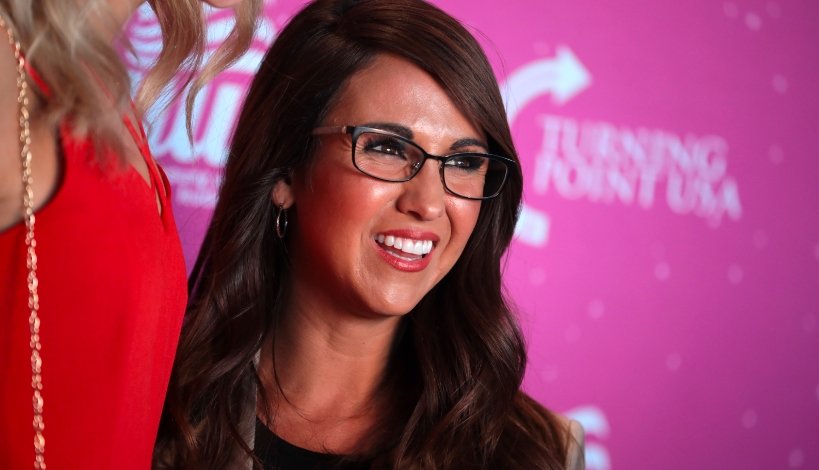Republican U.S. Rep. Lauren Boebert has secured a victory in Colorado’s 4th Congressional District, solidifying her role in the U.S. House despite switching districts to avoid a tough reelection fight in her previous constituency. The move, a calculated risk for the ultra-conservative Boebert, has proven successful as she defeated Democratic contender Trisha Calvarese.
A Strategic Move to a Safer District
Boebert’s shift from the 3rd Congressional District in the Rocky Mountains to the more conservative 4th District on Colorado’s Great Plains marks a significant decision. Her new district provides a more favorable voter base, ensuring a smoother reelection process than what she might have faced against Democrat Adam Frisch.
Frisch, who nearly unseated Boebert in 2022 with a narrow margin of just 546 votes, campaigned on opposition to what he termed her “angertainment” approach — a term suggesting Boebert’s penchant for controversial and confrontational politics. Following a challenging 2022 cycle, Boebert opted for a fresh start, citing a need to refocus her political efforts after a high-profile personal incident involving her behavior at a Denver theater.

Primary Battle and Endorsements Fuel Victory
Securing the Republican nomination in the new district wasn’t without its own challenges. In a crowded primary race, Boebert faced both criticism and competition. Opponents accused her of “carpetbagging” — moving districts solely for political gain — and referenced the Denver theater incident. Yet Boebert’s established conservative persona, coupled with a high-profile endorsement from Donald Trump, gave her an edge over her rivals.
Ultimately, Boebert’s reputation and alignment with Trump’s base carried her through the primary. Trump’s endorsement has held significant sway among Colorado Republicans, further energizing her campaign and reinforcing her appeal among voters who value her hardline stances.
Boebert’s Political Brand: Unyielding Conservatism
Boebert’s political persona, defined by staunch loyalty to conservative principles and uncompromising rhetoric, has attracted a loyal following. Known for her staunch opposition to House Speaker Kevin McCarthy during the January 2023 speaker election, Boebert has framed her actions as fulfilling campaign promises. She maintains that her resistance to compromise is a form of accountability to her voters.
Addressing her supporters in Windsor, Colorado, on election night, Boebert made her intentions clear. “I have taken on every swamp creature in Washington, D.C.,” she proclaimed to the crowd, emphasizing her commitment to fighting for her values. Wearing a “Make America Great Again” hat with Trump’s signature, Boebert positioned herself as a fighter, ready to tackle what she calls the “swamp” of D.C. politics.
Table: Key Aspects of Boebert’s Shift to Colorado’s 4th Congressional District
| Factor | Details |
|---|---|
| Previous District | Colorado’s 3rd Congressional District |
| New District | Colorado’s 4th Congressional District |
| Key Opponent in New District | Trisha Calvarese |
| Endorsement Advantage | Donald Trump’s endorsement |
| Primary Challenge | Accusations of carpetbagging and controversies from personal incidents |
| Election Night Message | “Fighting the swamp creatures in Washington” |
Impact on Colorado’s Political Landscape
Boebert’s move to the 4th District has raised questions about the 3rd District’s political future. With Boebert out of the race, Adam Frisch’s campaign has adjusted its strategy. Frisch, a moderate Democrat with a history as an Aspen councilman and currency trader, has drawn on his bipartisan approach, aiming to be a unifying voice for rural voters in the 3rd District. His emphasis on reducing divisive rhetoric is a clear departure from Boebert’s approach.
Frisch’s campaign has also benefited from an influx of donations, amassing one of the largest war chests for a non-incumbent House candidate. This fundraising boost reflects continued interest from national and local Democrats who see a potential opportunity to flip the seat. While the district leans Republican, Frisch’s financial advantage could give him a competitive edge.
New Faces in the 3rd District: GOP’s Jeff Hurd
The Republican Party’s candidate for Colorado’s 3rd District, Jeff Hurd, is a contrast to Boebert’s style. An attorney by profession, Hurd presents himself as a pragmatic conservative, aiming to focus on local issues rather than national headlines. Hurd’s goal is to shift attention away from the sensationalist image associated with Boebert, pledging to work in a quieter, more moderate manner.
Hurd’s strategy could resonate with 3rd District constituents, particularly those fatigued by the high-profile drama Boebert often attracts. His platform highlights his intent to prioritize Colorado’s local concerns without creating the media buzz that often surrounds Boebert.
In a district that has historically leaned red, Hurd’s more reserved approach may be a successful strategy. Despite Frisch’s substantial campaign funds, the district’s conservative tilt may still prove challenging for a Democrat.
Boebert’s Future in Congress
Boebert’s return to Congress ensures that the ultra-conservative faction of the GOP remains represented. She is likely to continue her role as a vocal figure in the House, particularly in the context of national issues where Trump’s influence remains relevant. Her victory reinforces a broader trend within the Republican Party — a shift towards vocal, populist voices who appeal to a core group of fervent supporters.
Her recent win also highlights the effectiveness of Trump’s endorsement in down-ballot races. Boebert’s unrelenting style resonates strongly with Trump-aligned voters, suggesting she will continue to be an influential conservative figure in the House.













